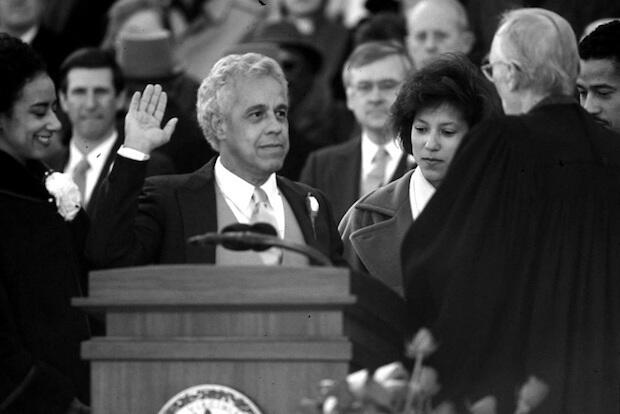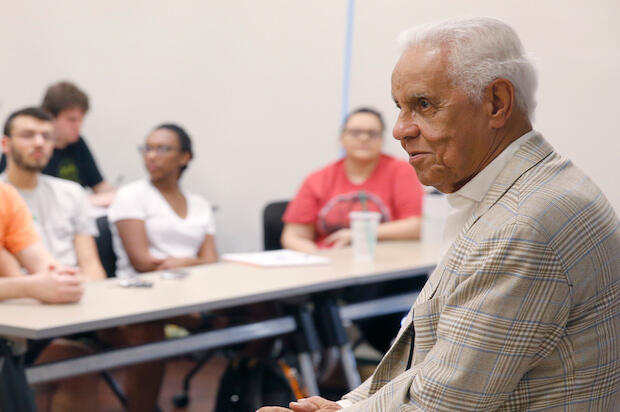
Sept. 18, 2020
VCU, VUU celebrate 30th anniversary of L. Douglas Wilder’s inauguration as Virginia’s 66th governor
Share this story
The L. Douglas Wilder School of Government and Public Affairs at Virginia Commonwealth University on Thursday marked the 30th anniversary of the inauguration of L. Douglas Wilder as the 66th governor of Virginia and the first elected African American governor in U.S. history.
Wilder, who served as governor from 1990 to 1994 and is now a distinguished professor at his namesake school, gave a keynote address before a virtual audience of 800 for the event, “L. Douglas Wilder: Continuing 30 Years of History, Then & Now,” co-hosted by VCU and Virginia Union University.
“Last November marked the 30th anniversary of me being elected governor. And I said [then], I’m more proud of the people of Virginia than anything else because of that,” Wilder said. “Humble and grateful for the support I’ve received throughout the 30-year odyssey. … But what happened in Virginia 30 years ago was felt across the nation, even in many quarters of the world.”
Wilder reflected back on his early days, growing up in the segregated Church Hill neighborhood of Richmond, learning perseverance and that “education was the key” to unlock barriers. He went on to attend Virginia Union, where he studied chemistry and graduated in 1951, before being drafted into the U.S. Army. He served in the Korean War, and was awarded a Bronze Star Medal for heroism.
Following the war, Wilder enrolled at Howard University School of Law.
“When you get to Howard law school, you’re instructed by people that say when you graduate go back to your communities and help, don’t get back to see how much you can do for yourself,” he said. “Go back and see how much you can do for others. Go provide opportunities that would unlock doors for them to proceed.”
Taking that advice to heart, Wilder founded a successful law practice and “started criticizing everything that was going on,” voicing his opinion in letters to the editor and speaking out on public issues.
“My law practice, though thriving, left me believing that there was more I needed to do,” he said. “I started criticizing those people who were in elected office, those seeking elected office. That made me realize, for the very first time, how important governing was. [And how important] those who sought to be government leaders were in determining the future of individuals.”
There was never an election like Doug Wilder’s. The international coverage, not just the national coverage, was blinding. … It made a big difference in terms of Virginia’s image. It changes Virginia’s image and I think, in that way, it contributed to the demographic diversity that has transformed Virginia.
Wilder ran for state Senate and won in 1969. He went on to serve in that chamber for 16 years. Looking back on his legislative service, Wilder highlighted accomplishments such as making Virginia the first state to declare a legislative holiday honoring Dr. Martin Luther King Jr., introducing legislation requiring Virginia state health plans to recognize sickle cell anemia, chairing a committee that enacted important juvenile justice reform, and creating a rehabilitation school authority that provided education for incarcerated young people.
When he ran for governor, he traveled to every corner of the state meeting voters. He recalled how his retail politicking was influenced by advice from the Democratic state senator from western Virginia, Madison Marye.
“His grandfather was a captain in the Confederate army. My grandfather was a slave. And he was helping me with doing a commercial down in Lunenburg, Virginia, and he said, ‘Doug, isn’t it interesting that here I am helping you get elected and when you consider the reverse roles of our grandfathers, isn’t that interesting?’ He said, ‘Doug, when you take that trip around the state, you need to shake every hand.’”
In shaking the hand of everyone he met on the campaign trail, Wilder recalled, he witnessed how you can’t judge people by how they look, where they live or where they come from.
“I never, ever questioned whether I could win or whether I should run. Because I knew that if you don’t judge people — and as Dr. King said, you judge them by the content of their character, not the color of their skin — it meant so much to me to show that to the world, to show that to the nation, that we in this country can, indeed, overcome.”
Wilder’s historic campaign drew the attention of the world, said Larry J. Sabato, Ph.D., professor of politics and director of the Center for Politics at the University of Virginia, in a video introduction to Thursday’s event.
“To this day, after having covered elections really since the 1960s, there was never an election like Doug Wilder’s,” Sabato said. “The international coverage, not just the national coverage, was blinding. You couldn’t go anywhere without running into a camera from somewhere else in the world. So it made a big difference in terms of Virginia’s image. It changes Virginia’s image and I think, in that way, it contributed to the demographic diversity that has transformed Virginia.”
After taking office as governor, Wilder was immediately faced with a state financial crisis that required perseverance and leadership.
“Once I became governor, I was disappointed to find out we were broke,” he said. “Before I even made my first speech, we were some $2-plus billion in the hole. And I can tell you that everyone said we are going to have to raise taxes. I said no we don’t. We’re going to have to be realistic. We’re going to have to spend for necessities, not niceties.”
He created the state’s rainy day fund, which allowed Virginia’s government to navigate the financial shortfall. The fund is still in place today.
“The current governor, I think, will be one of the first to tell you that he’s happy to know that even though our revenues are short today, even though we are not going to get the kinds of monies coming in we may have thought, he doesn’t have to tell the people of Virginia he’s going to raise their taxes. Because that reserve will be there for him to be able to go into it,” Wilder said.

As governor, Wilder advocated on behalf of the people and always kept them in mind when governing, said Susan Gooden, Ph.D., dean of the Wilder School.
“Many of the experiences that he’s advocated for, and the things that he’s pushed for — whether it’s education, whether it’s health, whether it’s economic investment — he really knows and understands the plight of the people and the concerns of the people. And I think that has always been something that he has taken very seriously. … That’s something that he’s always taken to heart.”
Wilder broke down barriers and inspired generations of African American leaders in politics and beyond, Gooden said.
“Everyone stands on the shoulders of others, and I think that’s something that’s important to keep in mind. And I know that Gov. Wilder would be the first to acknowledge that. And he’s had broad shoulders for others to stand on, not only in the commonwealth of Virginia but nationally,” she said. “And it goes without saying that breaking those barriers and accomplishing the senior levels of leadership, that does send a very, very important message relative to opportunity.”
Wilder, who also went on to serve as Richmond’s mayor, said his government service has been driven by the philosophy that “political leadership means leadership for the people. We are not just in [politics and policy] for ourselves,” he said. “We can work together. Parties can work together. People can work together. Races can work together. America can do better.
“We worked to make it better, not just for some, but for all,” he said.
Wilder’s keynote was just part of Thursday’s event, which also featured senior elected officials, political experts and students. It included a session looking back on 30 years of judicial and legislative history, a panel featuring Wilder School and Virginia Union University students on the importance of civic leadership, and a panel moderated by Sabato on the 2020 election.
Wilder also answered questions from attendees. One asked what advice he would give to young people interested in pursuing elected office. Before running for office, Wilder said he advised young people to first establish themselves in a career and be driven by purpose to serve.
“Have a career. What do you have in mind? What are you doing? You ask some of the candidates running for office, ‘What have you done?’ And they’ll say, ‘Well, I haven't had a chance.’ ‘Why haven't you had a chance? Have you been living? Have you been involved? Have you been out with the people? Have you listened to the people? Are you interested in running for yourself?’
“Don't let politics be your life. Let it be part of what you're doing in terms of your giving. And so it should be: listening to the people, advocating for the people — [in] the words of [Abraham] Lincoln: ‘of, for and by the people.’”
Subscribe to VCU News
Subscribe to VCU News at newsletter.vcu.edu and receive a selection of stories, videos, photos, news clips and event listings in your inbox.









